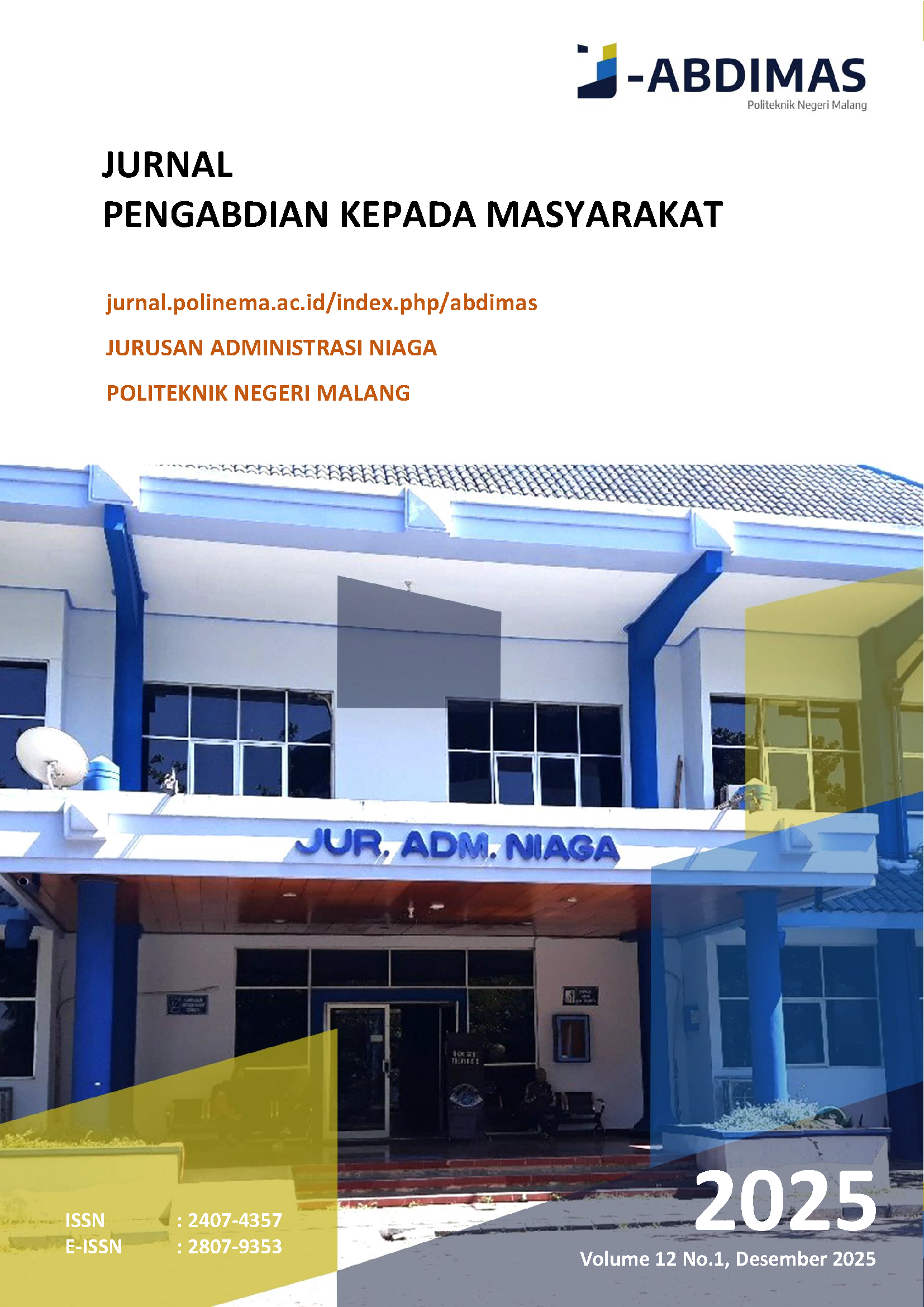EDUKASI PEDULI SAMPAH PADA SISWA SEKOLAH DASAR MADRASAH IBTIDA’IYAH NURUL HUDA KABUPATEN FAKFAK
DOI:
https://doi.org/10.33795/abdimas.v12i1.7324Keywords:
Environmental education, waste management, non-formal education, conservation, FakfakAbstract
Awareness of the importance of protecting the environment should not only be owned by everyone, both adults and children. Environmental education in elementary school is crucial because it is at this stage that children begin to understand the values of life and the importance of their role in keeping the environment clean. Currently, SD MI Nurul Huda Pasir Putih is committed to raising environmental awareness among students as part of character education. Based on the team's observation, the school does not yet have a structured special education program on waste management and environmental awareness. Most environmental learning activities are still general in nature and do not focus on concrete actions that can be applied by students in their daily lives. In addition, the school also faces limitations in terms of resources and learning materials that support environmental education programs. This activity was initiated to provide students with a deeper knowledge and understanding of the importance of keeping the environment clean, as well as teaching them how to manage waste properly. It is hoped that students can apply this knowledge in their daily lives and become agents of change in their neighborhood. The stages of this activity are preparation and survey, material delivery and interactive activities, documentation, evaluation, feedback collection, reporting, and follow-up. The team hopes that similar activities can be carried out in other schools, even from an early childhood education level.References
Undang-Undang Nomor 20 Tahun 2003 tentang Sistem Pendidikan Nasional.
A. Noverita, E. Darliana, dan T. Kisria Darsih, “PENDIDIKAN LINGKUNGAN HIDUP UNTUK MENINGKATKAN ECOLITERACY SISWA,” vol. 4, no. 1, 2022, [Daring]. Tersedia pada: http://jurnal.stkipalmaksum.ac.id/
P. Lingkungan, M. KESADARAN DAN PARTISIPASI MASYARAKAT Sumartan, N. Rahmah Wahyuddin, U. Ichsan Sidenreng Rappang Kabupaten Sidenreng Rappang, dan S. Selatan, “JURNAL ARUNA MENGABDI (ARMI) PENYULUHAN SAMPAH SEBAGAI INSTRUMEN”, [Daring]. Tersedia pada: https://ejournal.lotusaruna.id/index.php/armi
M. Wararatna dan R. Subekti, “EFEKTIVITAS DINAS LINGKUNGAN HIDUP DALAM MENGELOLA SAMPAH SEBAGAI UPAYA PERLINDUNGAN TERHADAP LINGKUNGAN,” 2022, [Daring]. Tersedia pada: https://ejournal.undiksha.ac.id/index.php/jkh
Undang-Undang Nomor 18 Tahun 2008 tentang Pengelolaan Sampah
D. Kota Magelang, Y. Kurniaty, W. Haji Bani Nararaya, R. Nabila Turawan, dan F. Nurmuhamad, “MENGEFEKTIFKAN PEMISAHAN JENIS SAMPAH SEBAGAI UPAYA PENGELOLAAN SAMPAH TERPADU,” 2016. [Daring]. Tersedia pada: http://dkpt.magelangkota.go.id/bidang/kebersihan,
A. Al Karim, G. Arie Wibowo, I. Mindarti Suryo Utomo, A. Aulia Aswagata, S. Assyafiah Loceret Nganjuk, dan J. Timur, “EDUKASI PENGELOLAAN SAMPAH SEBAGAI IMPLEMENTASI PROFIL PELAJAR PANCASILA PADA SISWA KELAS X SMAI ASSYAFIAH LOCERET NGANJUK”, doi: 10.31604/jpm.v6i8.2841-2848.
A. N. Trisni dkk., “Sekolah bijak sampah sebagai upaya edukasi pengelolaan sampah dalam paradigma baru di SD Negeri Margoyasan,” Abdimas Dewantara, vol. 6, no. 2, hlm. 108–117, 2023, doi: 10.30738/ad.v6i2.15567.
Downloads
Published
Issue
Section
License
Copyright (c) 2025 Jurnal Pengabdian kepada Masyarakat

This work is licensed under a Creative Commons Attribution 4.0 International License.










